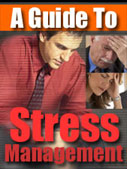|
Back to Stress
Management
Stress Management

Keeping Your Cool Managing Your Reactions to Stress
Keeping Your Cool Managing Your Reactions to
Stress
The television is blaring…the phone is ringing…and someone has
just arrived at the door.
You are under stress big-time.
As a result, you may feel a loss of control. If it is a
particularly bad day, you might even feel as if there is no way out. You feel overwhelmed and
ill-equipped to deal with the stress you are under.
What you may not realize is that it is entirely within your power
to manage stress in a healthier way. You may not have control over what happens in your life
but you can control your reaction to various stressors. All it takes is a little advanced
planning on your part.
Of course, a knee-jerk reaction to stress is to try to remove the
stress entirely from your life. But this is not always possible and, in some cases, it may
not be the best approach.
Instead, you might consider limiting your contact with a certain
stressor. In other words, if you are really feeling overwhelmed, can you take a break from
the action? Just a few minutes outside can help clear your head, enabling you to better
handle stress in the long run.
Another effective strategy is to consider delayed gratification.
For instance, say you enjoy a frappuccino in the morning, but you hate the commute to get to
the coffee shop.
Perhaps you can make the frappuccino a one-day-a-week treat
instead of an everyday affair.
Another habit that can make stress more difficult than it needs to
be is all-or-nothing thinking.
For instance, if you are having trouble studying for a test, do
you assume that you are going to fail?
If you have a disagreement with your spouse, do you think that he
or she will eventually leave you? If your mother is ill, do you begin worrying that she will
die soon?
Such disaster-oriented thinking can make a difficult situation
even more trying, even more stressful. By adopting a more realistic approach to problems, you
can limit your emotional reaction to stress.
Perfectionism may also be at the root of your stress.
If you think that you have to be perfect in the office and at
home, you can never really relax. In other words, you are putting yourself under unnecessary
stress.
If you begin to focus on performing tasks well rather than
perfectly, you can establish more realistic expectations for your life.
This new-and-improved thinking can enable you to face challenges
with more confidence.
Another mode of thinking that can lead to greater stress is a
winner-take-all philosophy. If you feel as if you always have to win, you set yourself up for
cut-throat competition.
This can be extremely destructive, especially to your
interpersonal relationships. It is much better to adopt an "everybody wins"
philosophy.
According to this viewpoint, the critical thing is to perform
those tasks that will do the most good. Following this philosophy, you are far more likely to
be able to take stress in stride.
Losing your temper can also cause you unnecessary stress. If you
are feeling as if you are about to explode, think of something calming, such as an ocean or a
tree. Do not give into the temptation to self-destruct.
Getting angry will not solve your problem and could, in fact,
create additional problems. If you feel as if your blood is about to boil, stay cool, take a
step back, and re-assess your options. With a clear head, you may be able to find the
solution to your problem relatively quickly.
Your stress level should also drop.
It should be said that it is not easy to control your reactions to
stress. It takes a great deal of time, patience, and emotional effort. If you tend to react
quickly to stress, you might have to teach yourself to slow your reactions.
You will have to learn to make controlling your reactions to
stress a habit. It is well worth the work involved. Otherwise, you could find yourself
battling a stress-related illness.
When all else fails, remember this slogan: Take a breath and take
a break. While you might lose some time in the short run, you could benefit a great deal over
the long haul.
And your friends and family might notice a distinct change in your
emotional reaction to stress.
|























